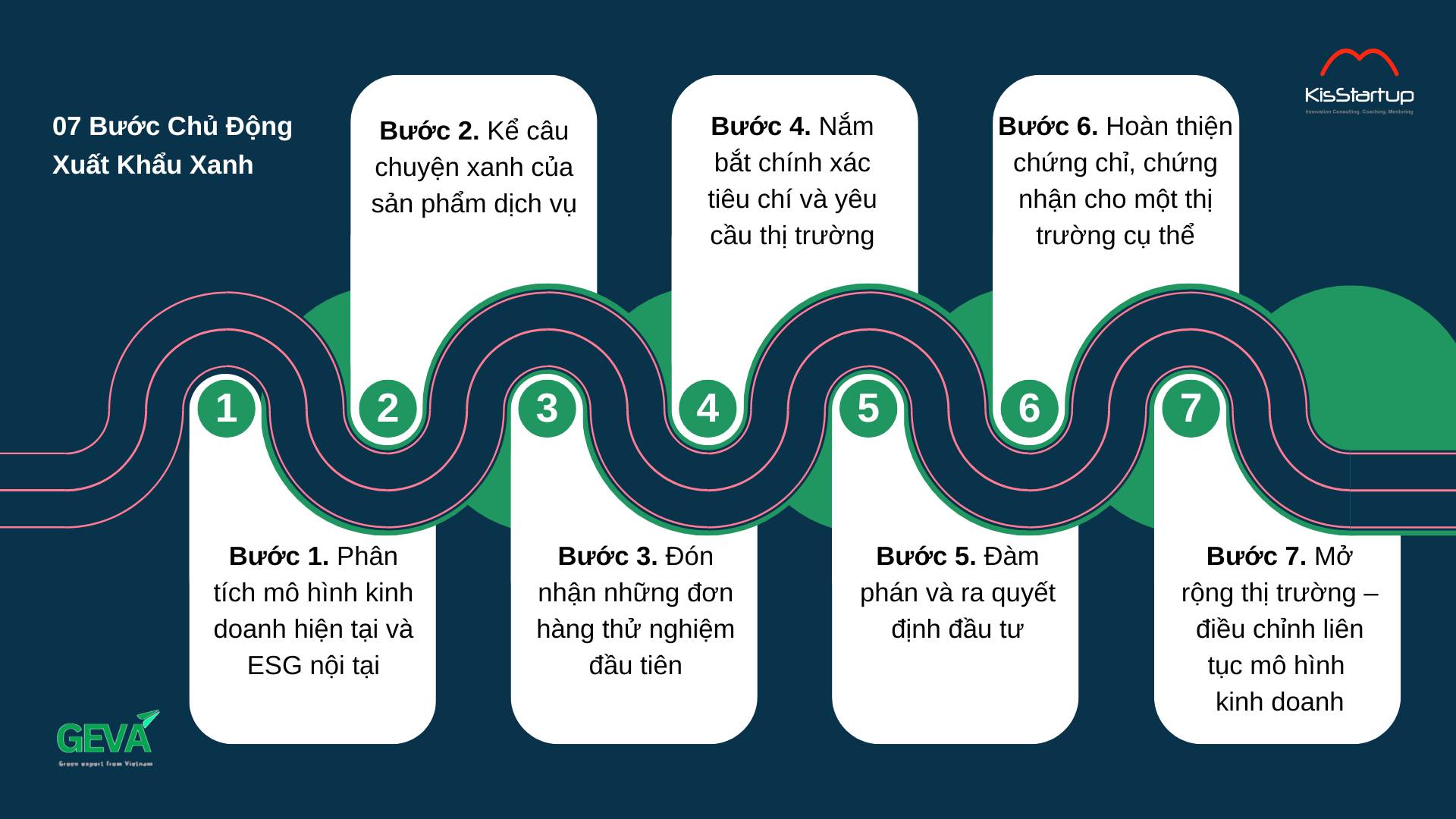In the global context, green, sustainable, and ESG (Environmental – Social – Governance) standards are no longer merely “external requirements” but have increasingly become a core internal foundation for businesses to assert their position and create long-term export opportunities.
Many Vietnamese businesses are still accustomed to a reactive approach—only making changes when requested by partners. However, practical experiences from successful businesses show that taking proactive steps from within—starting with their business models and internal governance—can pave the way for innovative pathways, well-aligned with their resources and capable of delivering sustainable competitive advantages.

The GEVA Project, implemented by KisStartup, has identified and analyzed 7 proactive steps to help businesses embark on a truly effective green export journey:
Step 1. Analyze Your Current Business Model and Internal ESG
The starting point is not external—it lies within the business itself. Break down your current business model using the 9 components of the Business Model Canvas and ask:
-
Where do the E (Environmental), S (Social), and G (Governance) factors currently stand?
-
What needs improvement?
For example:
-
Does your production process generate material waste?
-
Does your HR system ensure fair treatment and benefits?
-
Is your governance system transparent and capable of tracking ESG performance?
From there, build a concrete strategy to integrate ESG into your business model, rather than treating it as a slogan.
Step 2. Tell the Green Story of Your Products and Services
Global customers today don’t just buy products — they buy the story and values behind them. Proactively tell your sustainability journey:
-
How are farmers supported?
-
How are water and energy saved during production?
-
How has the business reduced emissions, recycled materials, or contributed socially?
Use websites, social media, catalogues, and trade fairs to build trust and stand out — before the market starts asking questions.
Step 3. Embrace Your First Trial Orders
Once your story is shared, the market will respond. Small international orders are your opportunity to test and learn. At this stage, businesses should:
-
Understand the needs and consumption habits of international customers.
-
Compare them with current capacity and resources.
-
Identify the gaps to bridge for further growth.
Learning through each trial order helps businesses adjust quickly while minimizing risks.
Step 4. Accurately Understand Market Standards and Requirements
Every market and customer has different standards. Instead of a vague “we need to be green,” clarify the specific criteria:
-
What is the maximum allowable chemical content?
-
What are the traceability requirements?
-
Which certifications are mandatory?
Proactively reach out to trade support organizations, participate in programs like GEVA or SwissTrade, or speak directly with partners to translate these requirements into internal operational language.
Step 5. Negotiate and Make Investment Decisions
At this stage, businesses must face reality: only when there’s demand can you invest confidently. Negotiate with customers for purchase commitments, then decide on:
-
Investing in new technology to meet standards.
-
Enhancing human resource capacity to manage ESG.
-
Adjusting processes to increase transparency.
This is the risk-balancing step, aligning market demands with internal capabilities.
Step 6. Complete Certifications for a Specific Market
Rather than spreading efforts across multiple certifications, focus on one priority market and obtain relevant sustainability certifications (e.g., Organic, Fairtrade, Rainforest Alliance).
Certifications are not just a “passport” but tangible proof of the ESG journey your business is undertaking.
Step 7. Expand Markets and Continuously Adapt the Business Model
Once you succeed in one market, leverage that experience and proof to expand to others. At the same time, continuously ask:
-
Does the current business model still fit the evolving ESG landscape?
-
What needs to be changed?
A “proactive check-and-adjust” mindset helps businesses stay agile and avoid chasing trends reactively.
Green export is not just about meeting partner requirements — it is a long-term strategy to create sustainable value and differentiation for Vietnamese businesses.
By starting from the business model, integrating ESG creatively, telling your story, and expanding step by step, businesses can proactively seize opportunities and design their own pathways to global markets, aligned with their unique strengths and resources.
To support businesses on this journey, KisStartup and the GEVA Project have developed three self-assessment toolkits to help businesses evaluate, adjust, and proactively shape their green export roadmap:
-
Green Export Readiness Assessment Toolkit – Helps businesses understand where they are in their export journey and what needs to be prepared.
-
Green Compliance Assessment Toolkit – Compares processes and products against green standards (e.g., USDA, Fairtrade).
-
Green Business Model Assessment Toolkit – Analyzes the current business model and identifies innovative directions aligned with ESG factors.
Businesses can start today by using these tools to map out their own journey, rather than waiting for partner requirements.
Copyright belongs to KisStartup. Content developed under the GEVA Project – Green Export Incubation and Acceleration through Voluntary Sustainability Standards (VSS). Any reproduction, quotation, or reuse must cite KisStartup/GEVA as the source.
About GEVA
The “Green Export Incubation and Acceleration through Voluntary Sustainability Standards (VSS)” program is funded by the Swiss Government, co-managed by the International Trade Centre (ITC) and the Vietnam Trade Promotion Agency (VIETRADE) under the Ministry of Industry and Trade, and implemented by KisStartup JSC from April 2025 to April 2026.
The project aims to strengthen the green export capacity of Vietnamese businesses through VSS, by providing training, consulting, incubation–acceleration activities, and international market linkages, helping businesses meet the increasingly strict requirements of global markets.
Contact Information
Fanpage: GreenExport Vietnam
Website: https://greenexport.vn/vi
Email: hello@kisstartup.com
Phone: (+84) 0392 161 403 (Mr. Hieu)
